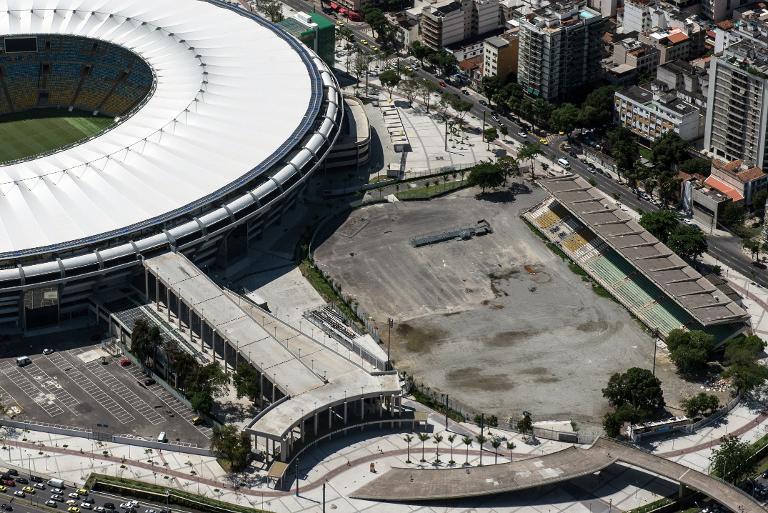(MENAFN- AFP) To residents of 2016 Olympic hosts Rio it seems an eternity ago that the likes of Michael Johnson and Sergei Bubka strutted their stuff at the Celio Barros stadium, just next door to the famous Maracana. But today, just as the spotlight falls on a country about to host the World Cup followed in 2016 by South America's first ever Summer Olympiad, the contrast between the iconic Maracana and the athletics arena could not be greater.Whereas the swanky, newly-refurbished Maracana is looking forward to hosting the World Cup final after a $450 million refit, the Celio Barros arena, less than two minutes walk away, lies forlorn and broken, its track ripped up and debris strewn across what remains of a ghost venue.The stadium, shut a year ago while the Maracana underwent its improvements, was threatened with demolition until last August, when state governor Sergio Cabral promised a rethink.But five months before the world descends on Brazil for the World Cup, the ruin offers a stark contrast to the shiny new football stadium -- a sporting equivalent of the social gulf in a country where the mega-rich live a few doors away from the dirt poor.
Young athletes gathered Thursday to demand the authorities act to save a piece of the city's sporting history.Some 100 people, many budding athletes, voiced frustration that central Rio now offers them no proper training facilities at a site today boasting nothing more than a pictorial homage to double Olympic triple jump champion Adhemar Ferreira da Silva and a rusting hulk of a stand.The 9,000-capacity venue has a proud, if relatively short history, having been built in the mid-1950s, just in time for Da Silva to prepare there for his exploits in Helksinki and Melbourne. Ukrainian pole vault legend Bubka and US sprint champion Johnson were just two star names to compete there in the 1996 Brazilian Grand Prix ahead of the Atlanta Games."It is ironic that in two years we will have the first Olympic Games in South America -- yet this stadium has gone to rack and ruin," said Edneida Freire, spokeswoman for Rio's Popular Committee for the (World) Cup and the Olympics."This stadium is part of our beautiful and historic heritage," Freire told AFP.The Rio authorities initially planned to knock down the stadium and replace it with a shopping mall or carpark, but last year had to row back in the teeth of fierce popular protest.The venue will now likely serve as a temporary car park-cum-fanfest area during the World Cup before a long-term solution is found."Only football is important here," sighed Freire's colleague Renato Cosentino."A shopping mall you can build anywhere, but how would that benefit local budding athletes? Here, only the construction companies benefit," grumbled Cosentino."But the government has had to back down owing to the protests. Everyone used to train here, Rio doesn't have anywhere else. And we don't need parking at the stadium -- people should park outside the city and travel in by metro."Two teenage students from Rio's Federal University, who gave their names as Nathan and Monique, told AFP: "We have nowhere to train; the government only cares about the World Cup."Aren't we the future? We'd like to be but where can we prepare for our dreams?" asks Nathan.Rio authorities estimate upgrading the Celio Barros facility would cost in the region of 10 million dollars.That is small change compared with the hundreds of millions being spent on 12 World Cup stadiums, but nonetheless a sizeable sum for a country already unloading some $30 billion on the World Cup and the Games combined.Outside the stadium, protesters carefully placed fruit and other snacks on a blanket as they settled down for a day of discontent.But before thinking of their stomachs they posed in front of banners they had hung across the stadium gates and railings."Maracana -- sporting temple or temple to consumerism?" read one."The Maracana is ours; Celio is ours too," read another.And finally, the common thread running through myriad World Cup-and Olympic-related protests:"We pay for construction; we pay for renovation -- and we pay for demolition."Unless, as the Rio state government promises, the stadium has a future. Legal Disclaimer:
MENAFN provides the
information “as is” without warranty of any kind. We do not accept
any responsibility or liability for the accuracy, content, images,
videos, licenses, completeness, legality, or reliability of the information
contained in this article. If you have any complaints or copyright
issues related to this article, kindly contact the provider above.




















Comments
No comment